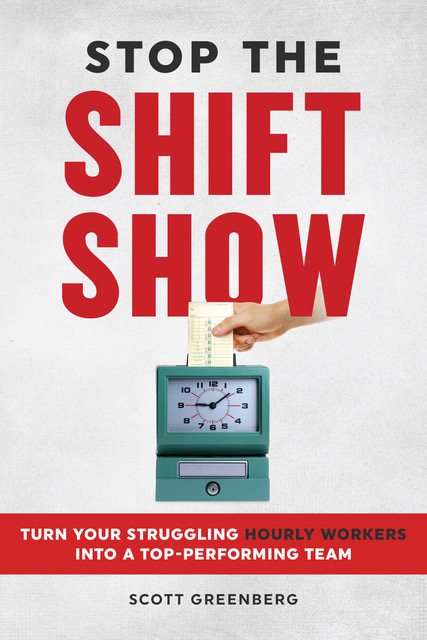Inspiring Hourly Workers
5 Min Read By MRM Staff
Retaining quality staff members is always a key challenge for restaurant operators. Scott Greenberg addresses that challenge in his new book, Stop the Shift Show: Turn Your Struggling Hourly Workers Into a Top-Performing Team.
Greenberg is an internationally recognized speaker, author and coach with franchise clients that include McDonalds, Great Clips, GNC, RE/MAX, Smoothie King, Global Franchise Group and many more. For 10 years, he was a multi-unit franchise owner with Edible Arrangements. He is also the author of the The Wealthy Franchisee: Game-Changing Steps to Becoming a Thriving Franchise Superstar.
In his new book, Scott Greenberg provides an inspiring, practical framework for management to explore their biases, habits, and leadership styles while learning how to refine the way they manage so they can more effectively recruit, retain, and motivate their hourly teams. The book offers practical strategies and techniques for effectively managing and coaching hourly workers, including:
- Determining your managerial style and avoiding common mistakes
- Building trust with your team to create a positive work culture
- Motivating employees to perform at their best and go above and beyond
- Developing effective coaching techniques to help team members grow and improve
- Creating a sense of purpose and ownership among employees to foster a high-performing team
- Overcoming common challenges in managing hourly workers, such as turnover and scheduling issues
To learn more, Modern Restaurant Management (MRM) magazine reached out to Greenberg.
What do you hope readers take away from the book?
I want readers to appreciate the profound differences between hourly workers and those on salary. The book also offers tools to engage employees, build better, longer-lasting teams them, and boost their performance. Mostly I want readers to believe that hourly workers really can do great things when they’re properly managed.
Why write this book now?
Restaurants have always struggled with hourly workers. With the increase in competition and availability of gig work, employers must now work harder than ever to attract and retain the best people. Generation Z prioritizes life balance and healthy work environments, and they won’t stay with jobs that can’t honor these values. I also wrote the book now because my Gen Z kids are preparing to enter the workforce, and it’s my hope that work won’t be something they have to endure. I want their bosses to role model what great management looks like, so the book is dedicated to my kids’ future employers.
How do you create a sense of purpose and ownership among employees when they are paid minimum wage?
Unless you give employees equity in the business, they’re never going to feel like owners and it’s unreasonable to expect them to. What they do own is the culture. Those who feel connected to it will contribute to it and protect it fiercely. That means management must define the culture they want, hire employees who are a fit for it, and then discuss it constantly, as much as they discuss operations.
But hourly employees don’t respond to abstract discussions of culture. Mission and purpose statements are often way too grand to have meaning for people engaged in manual, repetitive work. No one believes they’re “changing the world” by washing dishes. But they might buy into the idea they “provide extraordinary meal experiences that bring people joy.” That purpose is still aspirational, but also in proportion to the work they do. Values must also be more tangible. Clarify abstract values like 'integrity' with concrete behaviors. Your employees may not know what you mean by “integrity,” but they’ll get the agreement that employees should always speak the truth, follow through on commitments, and only speak kindly of others. If you create a positive, inclusive culture they’re proud to be a part of, they’ll care a lot more about their work.

How do managers inspire and support workers who might have to engage with challenging customers?
Employees should be prepared for this before it happens so it’s not so surprising or triggering. Train them to look beyond the rude behavior and “find the need.” What is it the customer really wants? Attention? Respect? To feel/look important? Be curious about the customer and see if you can get to the essence of what they’re looking for. Then meet that need. Don’t take their outburst personally, and don’t feel like you need to compete with them. There’s no need to defend yourself. You’re not there to win. You’re there to serve. Find the need.
Be sure to talk through these encounters with workers afterward to make sure they’re OK, and to identify any areas for learning and growth. Praise them for what they did well and thank them for their professionalism. And don’t be afraid to fire exceptionally rude customers. Ultimately your workers are more important.
What are the main reasons why workers start to struggle in a job?
Poor training. Management gets so busy being busy, they fail to give new workers the foundation for success. Showing them how to do things is not the same thing as instilling a skill. Proper training not only ensures employees have the competence and confidence they need, but it also communicates that you care about their success.
Another problem is that management can become too results-focused and neglect the people side of their work. They forget to check in with employees, to praise them, to reinforce culture, and to monitor the overall employee experience. Great managers supervise both the operation and their team.
What are key issues the restaurant industry faces that you feel are addressed in the book?
The book hits hard on hiring, retention, culture, and motivation – and how to do these effectively with hourly workers (compared to those on salary). It also explores management training itself, which is usually inadequate in the restaurant industry. Too often solid employees are promoted to management without being taught the people side of leadership, such as how to influence employees, engage them in their work, and unite them into a cohesive culture. Just because they have work experience and have demonstrated responsibility and trustworthiness doesn’t mean they have these other essential leadership skills. Restaurants need great management, so they need better management training.
In what ways can managers best reach younger generations of workers to address their needs?
Identify their needs without judging them. Calling them lazy, entitled, and thin-skinned won’t change anything. Bosses have complained about “kids these days” for generations. Kids all days have been imperfect – they’re kids! But every generation has found their way. Management needs to understand and adapt to Generation Z workers’ values, just as they need to adapt to Generation Z consumers’ values. In the current climate, that means providing flexible scheduling, promoting life balance and wellness (especially psychological wellness), using technology, and helping them see how this job is preparing them for their larger life goals. Those things matter to today’s workforce and are the key to engaging them.

